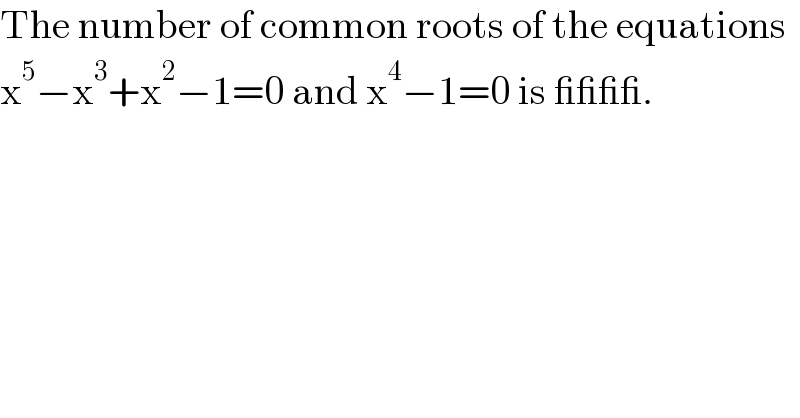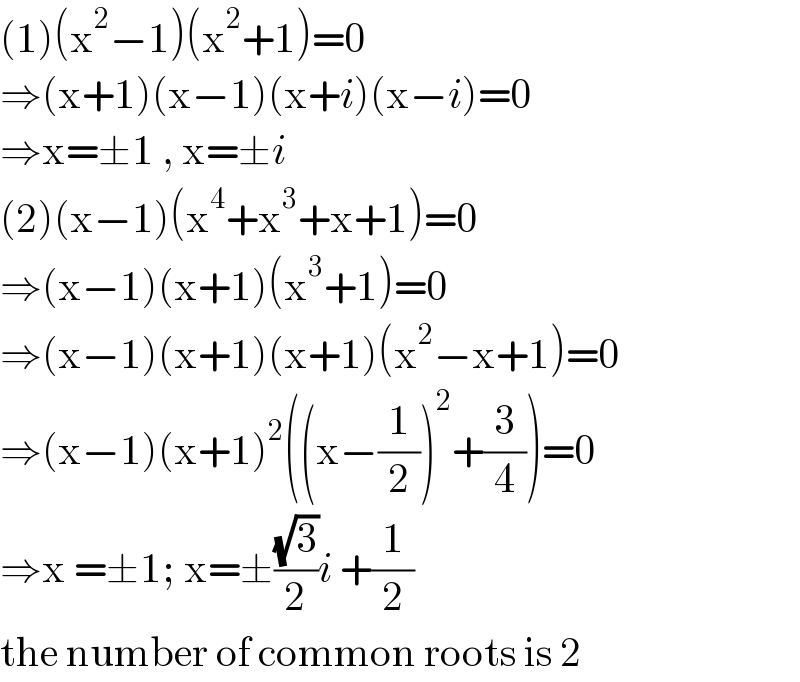
Question Number 140271 by EnterUsername last updated on 06/May/21

$$\mathrm{The}\:\mathrm{number}\:\mathrm{of}\:\mathrm{common}\:\mathrm{roots}\:\mathrm{of}\:\mathrm{the}\:\mathrm{equations} \\ $$$$\mathrm{x}^{\mathrm{5}} −\mathrm{x}^{\mathrm{3}} +\mathrm{x}^{\mathrm{2}} −\mathrm{1}=\mathrm{0}\:\mathrm{and}\:\mathrm{x}^{\mathrm{4}} −\mathrm{1}=\mathrm{0}\:\mathrm{is}\:\_\_\_\_. \\ $$
Answered by liberty last updated on 06/May/21

$$\left(\mathrm{1}\right)\left(\mathrm{x}^{\mathrm{2}} −\mathrm{1}\right)\left(\mathrm{x}^{\mathrm{2}} +\mathrm{1}\right)=\mathrm{0} \\ $$$$\Rightarrow\left(\mathrm{x}+\mathrm{1}\right)\left(\mathrm{x}−\mathrm{1}\right)\left(\mathrm{x}+{i}\right)\left(\mathrm{x}−{i}\right)=\mathrm{0} \\ $$$$\Rightarrow\mathrm{x}=\pm\mathrm{1}\:,\:\mathrm{x}=\pm{i} \\ $$$$\left(\mathrm{2}\right)\left(\mathrm{x}−\mathrm{1}\right)\left(\mathrm{x}^{\mathrm{4}} +\mathrm{x}^{\mathrm{3}} +\mathrm{x}+\mathrm{1}\right)=\mathrm{0} \\ $$$$\Rightarrow\left(\mathrm{x}−\mathrm{1}\right)\left(\mathrm{x}+\mathrm{1}\right)\left(\mathrm{x}^{\mathrm{3}} +\mathrm{1}\right)=\mathrm{0} \\ $$$$\Rightarrow\left(\mathrm{x}−\mathrm{1}\right)\left(\mathrm{x}+\mathrm{1}\right)\left(\mathrm{x}+\mathrm{1}\right)\left(\mathrm{x}^{\mathrm{2}} −\mathrm{x}+\mathrm{1}\right)=\mathrm{0} \\ $$$$\Rightarrow\left(\mathrm{x}−\mathrm{1}\right)\left(\mathrm{x}+\mathrm{1}\right)^{\mathrm{2}} \left(\left(\mathrm{x}−\frac{\mathrm{1}}{\mathrm{2}}\right)^{\mathrm{2}} +\frac{\mathrm{3}}{\mathrm{4}}\right)=\mathrm{0} \\ $$$$\Rightarrow\mathrm{x}\:=\pm\mathrm{1};\:\mathrm{x}=\pm\frac{\sqrt{\mathrm{3}}}{\mathrm{2}}{i}\:+\frac{\mathrm{1}}{\mathrm{2}} \\ $$$$\mathrm{the}\:\mathrm{number}\:\mathrm{of}\:\mathrm{common}\:\mathrm{roots}\:\mathrm{is}\:\mathrm{2} \\ $$
Commented by EnterUsername last updated on 06/May/21

$$\mathrm{Thank}\:\mathrm{you}! \\ $$
